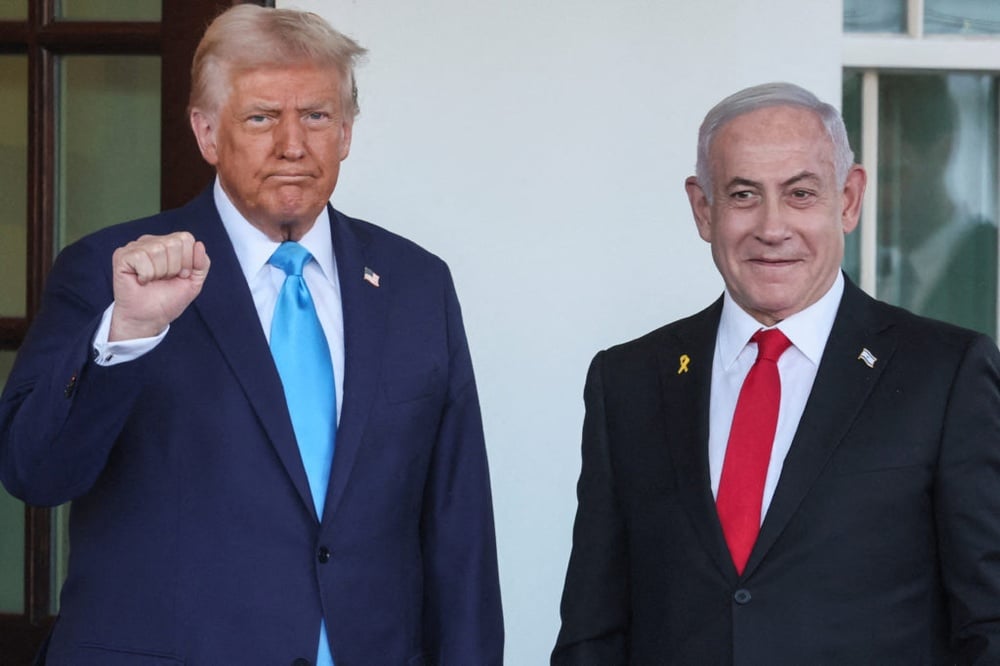
Article Bias: The article reports on the U.S. arms sale to Israel, highlighting congressional concerns regarding bypassing oversight while providing details on the deal itself, which may lead to a perceived pro-Trump and pro-Israel bias due to its straightforward reporting of facts without more critical context.
Social Shares: 6
This article is similar to White House makes emergency weapons sale to Israel, bypassing Congress again
🔵 Liberal <—> Conservative 🔴:
🗽 Libertarian <—> Authoritarian 🚔:
🗞️ Objective <—> Subjective 👁️ :
🚨 Sensational:
📉 Bearish <—> Bullish 📈:
📝 Prescriptive:
🕊️ Dovish <—> Hawkish 🦁:
😨 Fearful:
📞 Begging the Question:
🗣️ Gossip:
💭 Opinion:
🗳 Political:
Oversimplification:
🏛️ Appeal to Authority:
🍼 Immature:
🔄 Circular Reasoning:
👀 Covering Responses:
😢 Victimization:
😤 Overconfident:
🗑️ Spam:
✊ Ideological:
🏴 Anti-establishment <—> Pro-establishment 📺:
🙁 Negative <—> Positive 🙂:
📏📏 Double Standard:
❌ Uncredible <—> Credible ✅:
🧠 Rational <—> Irrational 🤪:
🤑 Advertising:
🐍 Manipulative:
🤖 Written by AI:
💔 Low Integrity <—> High Integrity ❤️:
AI Bias: Trained on diverse data; aim for neutrality.
Article Bias: The article reports on the US approval of a significant arms sale to Israel, emphasizing the context of the war in Gaza and past administrations' actions regarding military support, but it suggests a critically analytical view of the implications of such sales on civilian casualties, reflecting various perspectives on the conflict without overtly taking a position.
Social Shares: 14
🔵 Liberal <—> Conservative 🔴:
🗽 Libertarian <—> Authoritarian 🚔:
🗞️ Objective <—> Subjective 👁️ :
🚨 Sensational:
📉 Bearish <—> Bullish 📈:
📝 Prescriptive:
🕊️ Dovish <—> Hawkish 🦁:
😨 Fearful:
📞 Begging the Question:
🗣️ Gossip:
💭 Opinion:
🗳 Political:
Oversimplification:
🏛️ Appeal to Authority:
🍼 Immature:
🔄 Circular Reasoning:
👀 Covering Responses:
😢 Victimization:
😤 Overconfident:
🗑️ Spam:
✊ Ideological:
🏴 Anti-establishment <—> Pro-establishment 📺:
🙁 Negative <—> Positive 🙂:
📏📏 Double Standard:
❌ Uncredible <—> Credible ✅:
🧠 Rational <—> Irrational 🤪:
🤑 Advertising:
🤖 Written by AI:
💔 Low Integrity <—> High Integrity ❤️:
AI Bias: Neutral but may reflect training on diverse political perspectives.
Article Bias: The article reports on a significant arms sale to Israel announced by the State Department, highlighting the timing related to ongoing conflicts and political discussions involving President Trump and Israeli leaders, while also reflecting varying perspectives on the sale and its implications for regional stability.
Social Shares: 1,927
🔵 Liberal <—> Conservative 🔴:
🗞️ Objective <—> Subjective 👁️ :
🚨 Sensational:
📝 Prescriptive:
🕊️ Dovish <—> Hawkish 🦁:
💭 Opinion:
🗳 Political:
Oversimplification:
🏛️ Appeal to Authority:
✊ Ideological:
🏴 Anti-establishment <—> Pro-establishment 📺:
🙁 Negative <—> Positive 🙂:
❌ Uncredible <—> Credible ✅:
🧠 Rational <—> Irrational 🤪:
🎲 Speculation:
🐍 Manipulative:
💔 Low Integrity <—> High Integrity ❤️:
AI Bias:
Article Bias: The article reports on the Trump administration's arms sales to Israel, highlighting bipartisan concerns regarding the process, but may display a slight bias against the administration's approach, particularly in bypassing traditional congressional oversight.
Social Shares: 22
🔵 Liberal <—> Conservative 🔴:
🗽 Libertarian <—> Authoritarian 🚔:
🗞️ Objective <—> Subjective 👁️ :
🚨 Sensational:
📉 Bearish <—> Bullish 📈:
📝 Prescriptive:
🕊️ Dovish <—> Hawkish 🦁:
😨 Fearful:
📞 Begging the Question:
🗣️ Gossip:
💭 Opinion:
🗳 Political:
Oversimplification:
🏛️ Appeal to Authority:
🍼 Immature:
🔄 Circular Reasoning:
👀 Covering Responses:
😢 Victimization:
😤 Overconfident:
🗑️ Spam:
✊ Ideological:
🏴 Anti-establishment <—> Pro-establishment 📺:
🙁 Negative <—> Positive 🙂:
📏📏 Double Standard:
❌ Uncredible <—> Credible ✅:
🧠 Rational <—> Irrational 🤪:
🤑 Advertising:
🤖 Written by AI:
💔 Low Integrity <—> High Integrity ❤️:
AI Bias: Limited to news training data; lacks nuanced political perspective.
Article Bias: The article reports on the U.S. arms sale to Israel, highlighting congressional concerns regarding bypassing oversight while providing details on the deal itself, which may lead to a perceived pro-Trump and pro-Israel bias due to its straightforward reporting of facts without more critical context.
Social Shares: 6
This article is similar to White House makes emergency weapons sale to Israel, bypassing Congress again
🔵 Liberal <—> Conservative 🔴:
🗽 Libertarian <—> Authoritarian 🚔:
🗞️ Objective <—> Subjective 👁️ :
🚨 Sensational:
📉 Bearish <—> Bullish 📈:
📝 Prescriptive:
🕊️ Dovish <—> Hawkish 🦁:
😨 Fearful:
📞 Begging the Question:
🗣️ Gossip:
💭 Opinion:
🗳 Political:
Oversimplification:
🏛️ Appeal to Authority:
🍼 Immature:
🔄 Circular Reasoning:
👀 Covering Responses:
😢 Victimization:
😤 Overconfident:
🗑️ Spam:
✊ Ideological:
🏴 Anti-establishment <—> Pro-establishment 📺:
🙁 Negative <—> Positive 🙂:
📏📏 Double Standard:
❌ Uncredible <—> Credible ✅:
🧠 Rational <—> Irrational 🤪:
🤑 Advertising:
🐍 Manipulative:
🤖 Written by AI:
💔 Low Integrity <—> High Integrity ❤️:
AI Bias: Trained on diverse data; aim for neutrality.
Article Bias: The article reports on the US approval of a significant arms sale to Israel, emphasizing the context of the war in Gaza and past administrations' actions regarding military support, but it suggests a critically analytical view of the implications of such sales on civilian casualties, reflecting various perspectives on the conflict without overtly taking a position.
Social Shares: 14
🔵 Liberal <—> Conservative 🔴:
🗽 Libertarian <—> Authoritarian 🚔:
🗞️ Objective <—> Subjective 👁️ :
🚨 Sensational:
📉 Bearish <—> Bullish 📈:
📝 Prescriptive:
🕊️ Dovish <—> Hawkish 🦁:
😨 Fearful:
📞 Begging the Question:
🗣️ Gossip:
💭 Opinion:
🗳 Political:
Oversimplification:
🏛️ Appeal to Authority:
🍼 Immature:
🔄 Circular Reasoning:
👀 Covering Responses:
😢 Victimization:
😤 Overconfident:
🗑️ Spam:
✊ Ideological:
🏴 Anti-establishment <—> Pro-establishment 📺:
🙁 Negative <—> Positive 🙂:
📏📏 Double Standard:
❌ Uncredible <—> Credible ✅:
🧠 Rational <—> Irrational 🤪:
🤑 Advertising:
🤖 Written by AI:
💔 Low Integrity <—> High Integrity ❤️:
AI Bias: Neutral but may reflect training on diverse political perspectives.
Article Bias: The article reports on the Trump administration's arms sales to Israel, highlighting bipartisan concerns regarding the process, but may display a slight bias against the administration's approach, particularly in bypassing traditional congressional oversight.
Social Shares: 22
🔵 Liberal <—> Conservative 🔴:
🗽 Libertarian <—> Authoritarian 🚔:
🗞️ Objective <—> Subjective 👁️ :
🚨 Sensational:
📉 Bearish <—> Bullish 📈:
📝 Prescriptive:
🕊️ Dovish <—> Hawkish 🦁:
😨 Fearful:
📞 Begging the Question:
🗣️ Gossip:
💭 Opinion:
🗳 Political:
Oversimplification:
🏛️ Appeal to Authority:
🍼 Immature:
🔄 Circular Reasoning:
👀 Covering Responses:
😢 Victimization:
😤 Overconfident:
🗑️ Spam:
✊ Ideological:
🏴 Anti-establishment <—> Pro-establishment 📺:
🙁 Negative <—> Positive 🙂:
📏📏 Double Standard:
❌ Uncredible <—> Credible ✅:
🧠 Rational <—> Irrational 🤪:
🤑 Advertising:
🤖 Written by AI:
💔 Low Integrity <—> High Integrity ❤️:
AI Bias: Limited to news training data; lacks nuanced political perspective.
Human Rights Concerns
Article Bias: The article reports on a significant arms sale to Israel announced by the State Department, highlighting the timing related to ongoing conflicts and political discussions involving President Trump and Israeli leaders, while also reflecting varying perspectives on the sale and its implications for regional stability.
Social Shares: 1,927
🔵 Liberal <—> Conservative 🔴:
🗞️ Objective <—> Subjective 👁️ :
🚨 Sensational:
📝 Prescriptive:
🕊️ Dovish <—> Hawkish 🦁:
💭 Opinion:
🗳 Political:
Oversimplification:
🏛️ Appeal to Authority:
✊ Ideological:
🏴 Anti-establishment <—> Pro-establishment 📺:
🙁 Negative <—> Positive 🙂:
❌ Uncredible <—> Credible ✅:
🧠 Rational <—> Irrational 🤪:
🎲 Speculation:
🐍 Manipulative:
💔 Low Integrity <—> High Integrity ❤️:
AI Bias:
Article Bias: The article presents a critical perspective on the U.S. arms sales to Israel under both Trump and Biden, framing this action as complicity in ongoing violence against Palestinians and suggesting that there is little substantive difference between the foreign policies of the two administrations when it comes to Israel, thus displaying clear bias against pro-Israel narratives.
Social Shares: 0
🔵 Liberal <—> Conservative 🔴:
🗽 Libertarian <—> Authoritarian 🚔:
🗞️ Objective <—> Subjective 👁️ :
🚨 Sensational:
📉 Bearish <—> Bullish 📈:
📝 Prescriptive:
🕊️ Dovish <—> Hawkish 🦁:
😨 Fearful:
📞 Begging the Question:
🗣️ Gossip:
💭 Opinion:
🗳 Political:
Oversimplification:
🏛️ Appeal to Authority:
🍼 Immature:
🔄 Circular Reasoning:
👀 Covering Responses:
😢 Victimization:
😤 Overconfident:
🗑️ Spam:
✊ Ideological:
🏴 Anti-establishment <—> Pro-establishment 📺:
🙁 Negative <—> Positive 🙂:
📏📏 Double Standard:
❌ Uncredible <—> Credible ✅:
🧠 Rational <—> Irrational 🤪:
🤑 Advertising:
🐍 Manipulative:
🤖 Written by AI:
💔 Low Integrity <—> High Integrity ❤️:
AI Bias: My training data is diverse but may lean towards left-leaning perspectives.
Helium Bias
Story Blindspots
Article Bias: The article reports on the US approval of a significant arms sale to Israel, emphasizing the context of the war in Gaza and past administrations' actions regarding military support, but it suggests a critically analytical view of the implications of such sales on civilian casualties, reflecting various perspectives on the conflict without overtly taking a position.
Social Shares: 14
🔵 Liberal <—> Conservative 🔴:
🗽 Libertarian <—> Authoritarian 🚔:
🗞️ Objective <—> Subjective 👁️ :
🚨 Sensational:
📉 Bearish <—> Bullish 📈:
📝 Prescriptive:
🕊️ Dovish <—> Hawkish 🦁:
😨 Fearful:
📞 Begging the Question:
🗣️ Gossip:
💭 Opinion:
🗳 Political:
Oversimplification:
🏛️ Appeal to Authority:
🍼 Immature:
🔄 Circular Reasoning:
👀 Covering Responses:
😢 Victimization:
😤 Overconfident:
🗑️ Spam:
✊ Ideological:
🏴 Anti-establishment <—> Pro-establishment 📺:
🙁 Negative <—> Positive 🙂:
📏📏 Double Standard:
❌ Uncredible <—> Credible ✅:
🧠 Rational <—> Irrational 🤪:
🤑 Advertising:
🤖 Written by AI:
💔 Low Integrity <—> High Integrity ❤️:
AI Bias: Neutral but may reflect training on diverse political perspectives.
Article Bias: The article reports on the Trump administration's arms sales to Israel, highlighting bipartisan concerns regarding the process, but may display a slight bias against the administration's approach, particularly in bypassing traditional congressional oversight.
Social Shares: 22
🔵 Liberal <—> Conservative 🔴:
🗽 Libertarian <—> Authoritarian 🚔:
🗞️ Objective <—> Subjective 👁️ :
🚨 Sensational:
📉 Bearish <—> Bullish 📈:
📝 Prescriptive:
🕊️ Dovish <—> Hawkish 🦁:
😨 Fearful:
📞 Begging the Question:
🗣️ Gossip:
💭 Opinion:
🗳 Political:
Oversimplification:
🏛️ Appeal to Authority:
🍼 Immature:
🔄 Circular Reasoning:
👀 Covering Responses:
😢 Victimization:
😤 Overconfident:
🗑️ Spam:
✊ Ideological:
🏴 Anti-establishment <—> Pro-establishment 📺:
🙁 Negative <—> Positive 🙂:
📏📏 Double Standard:
❌ Uncredible <—> Credible ✅:
🧠 Rational <—> Irrational 🤪:
🤑 Advertising:
🤖 Written by AI:
💔 Low Integrity <—> High Integrity ❤️:
AI Bias: Limited to news training data; lacks nuanced political perspective.
Article Bias: The article reports on the US approval of a significant arms sale to Israel, emphasizing the context of the war in Gaza and past administrations' actions regarding military support, but it suggests a critically analytical view of the implications of such sales on civilian casualties, reflecting various perspectives on the conflict without overtly taking a position.
Social Shares: 14
🔵 Liberal <—> Conservative 🔴:
🗽 Libertarian <—> Authoritarian 🚔:
🗞️ Objective <—> Subjective 👁️ :
🚨 Sensational:
📉 Bearish <—> Bullish 📈:
📝 Prescriptive:
🕊️ Dovish <—> Hawkish 🦁:
😨 Fearful:
📞 Begging the Question:
🗣️ Gossip:
💭 Opinion:
🗳 Political:
Oversimplification:
🏛️ Appeal to Authority:
🍼 Immature:
🔄 Circular Reasoning:
👀 Covering Responses:
😢 Victimization:
😤 Overconfident:
🗑️ Spam:
✊ Ideological:
🏴 Anti-establishment <—> Pro-establishment 📺:
🙁 Negative <—> Positive 🙂:
📏📏 Double Standard:
❌ Uncredible <—> Credible ✅:
🧠 Rational <—> Irrational 🤪:
🤑 Advertising:
🤖 Written by AI:
💔 Low Integrity <—> High Integrity ❤️:
AI Bias: Neutral but may reflect training on diverse political perspectives.
Article Bias: The article reports on the U.S. arms sale to Israel, highlighting congressional concerns regarding bypassing oversight while providing details on the deal itself, which may lead to a perceived pro-Trump and pro-Israel bias due to its straightforward reporting of facts without more critical context.
Social Shares: 6
This article is similar to White House makes emergency weapons sale to Israel, bypassing Congress again
🔵 Liberal <—> Conservative 🔴:
🗽 Libertarian <—> Authoritarian 🚔:
🗞️ Objective <—> Subjective 👁️ :
🚨 Sensational:
📉 Bearish <—> Bullish 📈:
📝 Prescriptive:
🕊️ Dovish <—> Hawkish 🦁:
😨 Fearful:
📞 Begging the Question:
🗣️ Gossip:
💭 Opinion:
🗳 Political:
Oversimplification:
🏛️ Appeal to Authority:
🍼 Immature:
🔄 Circular Reasoning:
👀 Covering Responses:
😢 Victimization:
😤 Overconfident:
🗑️ Spam:
✊ Ideological:
🏴 Anti-establishment <—> Pro-establishment 📺:
🙁 Negative <—> Positive 🙂:
📏📏 Double Standard:
❌ Uncredible <—> Credible ✅:
🧠 Rational <—> Irrational 🤪:
🤑 Advertising:
🐍 Manipulative:
🤖 Written by AI:
💔 Low Integrity <—> High Integrity ❤️:
AI Bias: Trained on diverse data; aim for neutrality.
Article Bias: The article reports on a significant arms sale to Israel announced by the State Department, highlighting the timing related to ongoing conflicts and political discussions involving President Trump and Israeli leaders, while also reflecting varying perspectives on the sale and its implications for regional stability.
Social Shares: 1,927
🔵 Liberal <—> Conservative 🔴:
🗞️ Objective <—> Subjective 👁️ :
🚨 Sensational:
📝 Prescriptive:
🕊️ Dovish <—> Hawkish 🦁:
💭 Opinion:
🗳 Political:
Oversimplification:
🏛️ Appeal to Authority:
✊ Ideological:
🏴 Anti-establishment <—> Pro-establishment 📺:
🙁 Negative <—> Positive 🙂:
❌ Uncredible <—> Credible ✅:
🧠 Rational <—> Irrational 🤪:
🎲 Speculation:
🐍 Manipulative:
💔 Low Integrity <—> High Integrity ❤️:
AI Bias:
Article Bias: The article presents a critical perspective on the U.S. arms sales to Israel under both Trump and Biden, framing this action as complicity in ongoing violence against Palestinians and suggesting that there is little substantive difference between the foreign policies of the two administrations when it comes to Israel, thus displaying clear bias against pro-Israel narratives.
Social Shares: 0
🔵 Liberal <—> Conservative 🔴:
🗽 Libertarian <—> Authoritarian 🚔:
🗞️ Objective <—> Subjective 👁️ :
🚨 Sensational:
📉 Bearish <—> Bullish 📈:
📝 Prescriptive:
🕊️ Dovish <—> Hawkish 🦁:
😨 Fearful:
📞 Begging the Question:
🗣️ Gossip:
💭 Opinion:
🗳 Political:
Oversimplification:
🏛️ Appeal to Authority:
🍼 Immature:
🔄 Circular Reasoning:
👀 Covering Responses:
😢 Victimization:
😤 Overconfident:
🗑️ Spam:
✊ Ideological:
🏴 Anti-establishment <—> Pro-establishment 📺:
🙁 Negative <—> Positive 🙂:
📏📏 Double Standard:
❌ Uncredible <—> Credible ✅:
🧠 Rational <—> Irrational 🤪:
🤑 Advertising:
🐍 Manipulative:
🤖 Written by AI:
💔 Low Integrity <—> High Integrity ❤️:
AI Bias: My training data is diverse but may lean towards left-leaning perspectives.
Article Bias: The article reports on a significant arms sale to Israel announced by the State Department, highlighting the timing related to ongoing conflicts and political discussions involving President Trump and Israeli leaders, while also reflecting varying perspectives on the sale and its implications for regional stability.
Social Shares: 1,927
🔵 Liberal <—> Conservative 🔴:
🗞️ Objective <—> Subjective 👁️ :
🚨 Sensational:
📝 Prescriptive:
🕊️ Dovish <—> Hawkish 🦁:
💭 Opinion:
🗳 Political:
Oversimplification:
🏛️ Appeal to Authority:
✊ Ideological:
🏴 Anti-establishment <—> Pro-establishment 📺:
🙁 Negative <—> Positive 🙂:
❌ Uncredible <—> Credible ✅:
🧠 Rational <—> Irrational 🤪:
🎲 Speculation:
🐍 Manipulative:
💔 Low Integrity <—> High Integrity ❤️:
AI Bias:
On the topic of arms sales to Israel, social media sentiment reveals a spectrum of emotions and perspectives:
Overall, the conversation reflects a complex interplay of moral, political, and economic considerations, with users advocating for a nuanced approach to arms sales that balances security needs with ethical responsibilities.



Click points to explore news by date. News sentiment ranges from -10 (very negative) to +10 (very positive) where 0 is neutral.
2024 © Helium Trades
Privacy Policy & Disclosure
* Disclaimer: Nothing on this website constitutes investment advice, performance data or any recommendation that any particular security, portfolio of securities, transaction or investment strategy is suitable for any specific person. Helium Trades is not responsible in any way for the accuracy
of any model predictions or price data. Any mention of a particular security and related prediction data is not a recommendation to buy or sell that security. Investments in securities involve the risk of loss. Past performance is no guarantee of future results. Helium Trades is not responsible for any of your investment decisions,
you should consult a financial expert before engaging in any transaction.
![]() Ask any question about this page!
Ask any question about this page!